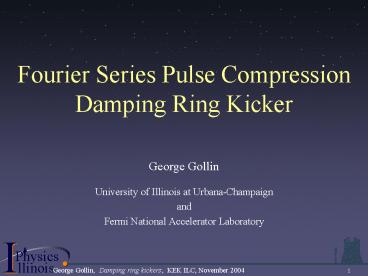Fourier Series Pulse Compression Damping Ring Kicker
Title:
Fourier Series Pulse Compression Damping Ring Kicker
Description:
... Pulse Compression Damping Ring Kicker. George Gollin ... Small ring kicker rise, fall times can be ... George Gollin, Damping ring kickers, KEK ILC, ... –
Number of Views:85
Avg rating:3.0/5.0
Title: Fourier Series Pulse Compression Damping Ring Kicker
1
Fourier Series Pulse Compression Damping Ring
Kicker
- George Gollin
- University of Illinois at Urbana-Champaign
- and
- Fermi National Accelerator Laboratory
2
The specs
- Dog bone (TESLA TDR) kicker specs
- impulse 100 G-m (3 MeV/c) 0.07 G-m (2 keV/c)
- residual (off) impulse 0 0.07 G-m (2 keV/c)
- rise/fall time lt 20 ns
- Perhaps larger (but less precise) impulse at
injection, smaller (but more precise) impulse at
extraction will be desirable. - Small ring kicker rise, fall times can be
asymmetric - leading edge lt 6 ns, trailing edge lt 60 ns
3
Fourier series pulse compression kicker
Instead of a pulsed kicker, construct a kicking
pulse from a sum of its Fourier
components. Combine this with a pulse compression
system to drive a small number of low-Q
cavities. Illinois, Fermilab, Cornell are
involved.
4
Participants
This project is part of the US university-based
Linear Collider RD effort (LCRD/UCLC)
University of Illinois Guy Bresler Joe
Calvey Michael Davidsaver Keri Dixon George
Gollin Mike Haney Tom Junk Jeremy Williams
Fermilab Brian Chase David Finley Chris
Jensen George Krafczyk Shekhar Mishra François
Ostiguy Ralph Pasquinelli Phillipe Piot John
Reid Vladimir Shiltsev Nikolay Solyak Ding Sun
Cornell University Joe Rogers
5
Fermilab/Illinois activities
- Initial studies use Fermilab A0 photoinjector
beam (16 MeV electrons) for studies - build a fast, simple strip line kicker
- use the kicker to study the timing/stability
properties of the A0 beam - build a single-module pulse compression kicker
- study its behavior at A0
- perform more detailed studies in a higher energy,
low emittance beam (ATF??)
6
Right now simulations and RF engineering
discussions
7
and writing it up so it is clearly described
8
and building a stripline kicker.
Start with a simple kicker whose properties are
calculable and can be measured independently of
its effects on the A0 electron beam. Most
important how well can we measure a devices
amplitude and timing stability with the A0 beam?
Fermilab is currently building this. Probably
ready by January 2005.
9
Test it in the FNAL A0 photoinjector beam
16 MeV electron beam, good spot size,
emittance. EOI submitted to A0 group last
spring. Space in beamline will be available
January 2005
10
UIUC/FNAL, longer term plans
- Design, then build one module using existing
components. - Fermilab RF group is involved
- UIUC HEP electronics design groups chief is too.
- So were making progress.
- Goals
- install strip line kicker in A0 by January, 2005
- understand A0 by spring, 2005
- investigate small pulse compression system by
summer, 2005































